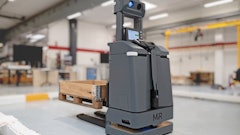
The used electric vehicle (EV) market is struggling to solve how to accurately estimate battery health data. Advanced forklift battery manufacturers developed a solution years ago, which is only becoming more precise as data and practical experience accumulate.
Assessing the health of the battery and accurately predicting its lifetime and value are all critical to the pricing of a used vehicle, given that the battery is a major cost factor for an EV. However, this assessment is contingent on several factors: weather conditions, charging patterns, driving behaviors, and sometimes, minor manufacturing defects.
Without an accurate read on the health of the battery, secondary buyers tend to drive down the cost of used EVs. Naturally, this has an impact on sellers of all persuasions, including dealers of commercial vehicles selling or leasing battery-powered equipment.
Advanced lithium battery solutions used for forklifts offer highly developed and nuanced data capabilities. Fleet managers can gain detailed insight into their forklift batteries, making reporting and predicting more streamlined and more automated than it’s ever been.
How the EV market is solving this problem
The EV market still has ground to cover because navigating the uncertainties of battery life depends on the availability and relevance of data. At present, some companies have more data on common vehicles being used in common locations vs. uncommon vehicles being used in uncommon locations.
Charging behaviors are also a key factor, but the availability of this data depends on whether drivers agree to allow it to be tracked. As a result, this type of data could take longer to collect.
How a lithium battery data solution is solving this problem
Some forklift batteries feature data capabilities that make it possible to monitor battery performance and accurately access information on the current and future battery health.
Points on every battery
Battery management systems allow you to collect dozens of data points on the entire battery inventory. This makes the process of managing batteries simple. You can check battery health, how one battery performs compared to the others, and how long they are at work from a single, convenient, central dashboard.
Remote diagnostics and troubleshooting
Technicians must be trained to connect to the battery management system (BMS) interface and perform maintenance. Fortunately, wireless battery systems aren’t complicated. With all batteries connected to one platform, you can check up on the performance of an entire lift truck fleet from an online dashboard.
Many potential battery performance issues can be solved remotely, without a technician’s physical presence at the site.
Conclusion
Fundamentally, if battery monitoring can be improved, then the value of a used EV can be more accurately measured. If you have accurate and predictable data points you can cite, it can reassure secondary buyers about their investment and add transparency and trust to the secondary EV market.





























